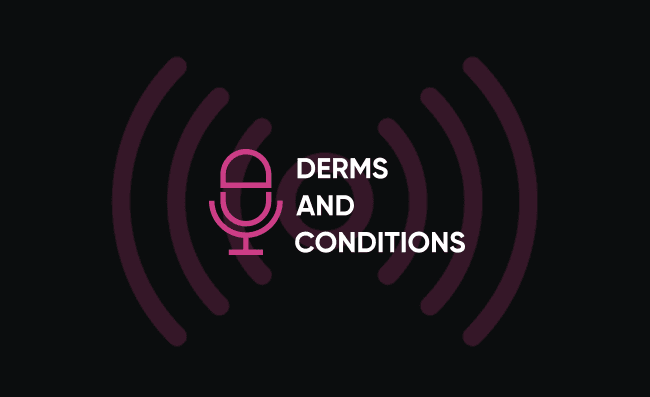Derms and Conditions Podcast Episode 66:
Untangling the Questions and Challenges in Patients with Hair Loss: Part 1
Featuring Jeff Donovan, MD | Release Date: December 14, 2023
In episode 66 of Derms and Conditions, our host, Dr James Q. Del Rosso, sits down with Dr Jeff Donovan, a US and Canadian board-certified dermatologist specializing in the treatment of hair loss. In part one of this series, the two discuss how to approach patients with alopecia areata.
Dr Donovan starts by discussing conditions that can mimic and easily be confused for alopecia areata, such as cutaneous t-cell lymphoma and lichen planopilaris. Dr Del Rosso asks when a biopsy should be done to confirm the diagnosis of alopecia, prompting Dr Donovan to share his suggestions on biopsy caliber, appropriate sites for biopsy, and the ideal pathologist review of the sample. However, he notes that with strong dermoscopic confirmation, a biopsy may not be necessary.
Next, Dr Donovan notes the potential topical treatments for patchy alopecia areata, including topical clobetasol, topical minoxidil, and steroid injections, which are effective treatments for the vast majority of patients and should result in hair regrowth within a few months. Dr Del Rosso then asks about the use of baricitinib and ritlecitinib in patients with severe alopecia areata, defined as having a Severity of Alopecia Tool (SALT) score greater than 50 (indicates 50% hair loss). Dr Donovan notes that in the studies on baricitinib, patients had a severe mean SALT score between 85 and 90 (between 85 and 90% hair loss) but still experienced significant regrowth. However, Dr Del Rosso mentions that the studies have earlier endpoints, which fail to capture regrowth that happens with longer term use, and Dr Donovan agrees that the data is promising and more long term data will help capture the longitudinal effect.
Dr Del Rosso transitions to the use of JAK inhibitors for alopecia areata and the favorable safety data around them in this population. Dr Donovan agrees that for younger patients with few to no comorbidities, JAK inhibitors have had minimal safety concerns. However, he notes that he counsels patients that the longer term side effects of baricitinib are currently unknown, as the data only extends to 2 years. He also states that he likes to have patients be on baricitinib for at least 6 months before considering switching to another JAK inhibitor or making a modification like adding oral minoxidil.
The two finish by discussing the use of minoxidil in alopecia areata, and Dr Donovan states that the anecdotal evidence is promising, and the drug is well tolerated, but more studies examining the effects are needed. Dr Donovan then mentions that patients with chronic alopecia areata who experienced regrowth on JAK inhibitors should continue therapy to maintain their results, as the chance of spontaneous regrowth is quite low. However, he states that it may be worth waiting to start a JAK inhibitor in a more recent onset alopecia areata, as there can be a high probability of spontaneous regrowth. Tune in to find out more!

EPISODE 63
What is Dr Adam Friedman Up To Now?